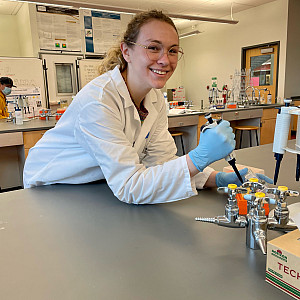Looking Upstream to Understand Disparities in Health Outcomes
Sabrina Sanchez’17 is pursuing graduate studies to better understand and fix the structural factors that result in health outcome disparities.
Teacher, doctor, lawyer. As an incoming student, these were the jobs Sabrina Sanchez’17 associated with college graduates. Thanks to Beloit’s peer mentors, faculty, staff, and alumni, she discovered additional possibilities.
A Wisconsin resident and first-generation college student, Sabrina initially limited her college search to public institutions. Suggestions her grandmother, a respiratory therapist, received from her hospital colleagues led Sabrina to consider private colleges as well. Not only might a private college better support her in a quest to become a medical doctor, but financial aid could make attendance possible.
Sabrina would receive substantial offers of aid from more than one private college. Ultimately, however, it was Beloit College that “felt right.”
Still, she was nervous. Would a cultural and financial gap between her and the other students make it hard to fit in?
Reassurance came via a Beloit College summer bridge program. “I was nervous coming to college,” she shares, “but meeting other new students and peer mentors through the bridge program helped me feel more comfortable.” First-generation students were not only succeeding at Beloit, but were available to help the students coming after them.
The peer mentorship that helped Sabrina ease into college life would also support her as she took steps to prepare for doctoral studies by applying and being accepted to participate in the college’s McNair Scholars program. The McNair program provides students traditionally underrepresented in higher education with research and other scholarly experiences to encourage them to earn doctorates and diversify the professoriate. The program intentionally encourages McNair Scholars to develop close ties with each other and with their faculty advisors.
“The McNair Scholars program helps build your confidence. It helps you see that you can go to graduate school and do research, both because you are acquiring the skills and knowledge you need for that, and because you are introduced to more senior McNair Scholars who have been successful. The program also helps you explore what you really care about and want to pursue.”
Sabrina’s research experiences as a McNair scholar bear this out. Guided by psychologist Suzanne Cox, in the summer after her sophomore year she studied youth experiences with racial microaggressions using quantitative research methods. Her goal was to better understand the impact of such aggressions on adolescent self-esteem. Simultaneously, she was working for the college’s Upward Bound program, which helps high school students underrepresented in higher education prepare for college. Students she met through the program contributed to her research.
Sabrina would then acquire qualitative research skills by contributing to a year-long study of Black women’s experiences on predominantly white college campuses. Anthropologist Dr. Nicole Truesdell, then director of Beloit’s Office of Academic Diversity and Inclusiveness, was the project’s principal investigator and faculty mentor. Sabrina’s research partners were fellow students. Today she uses both qualitative and quantitative methods in her research.
Along the way, Sabrina ruled out medical school. From Beloit alumni she’d learned about the personal and financial toll medical studies could take. But the alumni, and others at Beloit were helping her to also realize that she had more than the three career options she’d identified as a college applicant. “It clicked. If I earned a PhD, I’d be able to pursue a career that fit me and have the doctor title important to my family.”
Fortunately, courses she’d taken in her first year at Beloit could support her as her studies took a new direction. “I took microbiology, anthropology, and Spanish in my first year. I’d chosen them because they interested me, but they could also prepare me to go to medical school. Fortunately, those courses also fit well with the health and society major.”
The major was attractive because it spoke to Sabrina’s interests in health and social justice. She’d also earn a minor in Spanish and spend a semester studying abroad in Spain.
Faculty and staff were key to helping prepare Sabrina for graduate studies. In addition to doctors Cox and Truesdell, sociologist Kate Linnenberg, anthropologists Lisa Anderson-Levy and Nancy Krusko, and political scientist Ron Watson stand out as influential and supportive. Plus, Vanessa Beckham, Sabrina’s supervisor in the Upward Bound program, was “the best boss ever.”
Wedding celebration. From left to right, Bonnie Willison, Winona Albano-Bachtell, Jennifer Allmaras, Sabrina Sanchez, and Oceana Gilliam, all class of 2017
Today, Sabrina is a PhD student in the sociology department at the University of Wisconsin-Madison, with a subfield concentration in demography and ecology. Having completed the program’s coursework, she’s focusing on research for her doctoral dissertation and career development. Thus, on any given day, in addition to conducting research, she might give a guest lecture in a class, confer with her advisor, meet with graduate students with whom she is collaborating on a project, or attend a seminar or lecture.
And having benefited while at Beloit from peer mentoring and alumni connections, she’s taking time to pay it forward. She thus serves as a graduate student mentor at UW and returns to Beloit College, in person and virtually, to speak with students so that they can benefit from her experience and insights.



